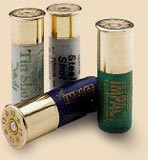| Contact us |
| Try wildfowling |
| Club merchandise |
| Wildfowl art |
| Wildfowling books |
| Join KWCA |
| Search |

Non toxic shot
The
alternatives
Over 40 lead alternatives have been tried over the years but few have
proved commercially successful. In the UK, several new shot types now
provide a choice in place of traditional lead. The types are listed alphabetically
and not in any order of merit.
Bismuth
A heavy metal like lead but rather
brittle, Bismuth lies next to lead on the periodic table. It is very similar to
lead in density. There are limited world supplies hence it is expensive.
Density around 9.6g/cc (compared with 11.0 for lead shot). It is generally good
ballistically, no problem in guns and environmentally acceptable. It costs 3-5
times lead depending on the load and is cheaper when bought in bulk. Boxes in
10 or 25.
* Not for use in shotguns having damascus or twist steel barrels.
Steel
Really "soft"
iron (density 7.8g/cc) but still much harder than lead and must be contained in
a plastic wad to protect barrels from scratches. It is the most developed and
least expensive alternative. Steel suffers much bad press, prejudice and misinformation
over its effectiveness and regarding potential damage to guns - care is needed
to ensure that your gun is suitable for use with steel shot.
Under International
proof Commission (CIP) rules there are two types, "Standard Steel" and
"High Performance Steel". It is complicated but essential to know the
difference as the rules are there to ensure safety to both gun and user. It should
be clear from each box of steel cartridges which is which - also only use boxes
with standard proof house approval to be confident they meet CIP requirements.
Standard steel can be fired through guns proofed standard or magnum for lead provided
their performance and pellet size do not exceed certain limits. If they do then,
according to CIP, the more powerful cartridges can be fired only through guns
that have passed a special Steel Shot Proof (recognised by "Steel Shot"
and a Fleur de Lys stamped on the barrels) because it is now a high performance
steel load.
The CIP recommend no more than half choke with steel (the British proof
Authorities recommend quarter choke for traditional lightweight game guns).
Steel should not be fired through any Damascus barreled gun.
Care is needed
in storage (no dampness), use (keep dry, avoid ricochet), and in eating game (teeth).
The shot does not rust in meat. Steel shot is environmentally acceptable.
Tin
This has a slightly lower density than steel (7.3g/cc) but is not as hard
and can be in plastic or fibre wad. Less expensive than bismuth/tungsten,
it is not restricted by CIP limits on velocity etc. so can be loaded to
compensate for low density. Appears environmentally acceptable, tin is
used widely in food packaging. No problems for guns.
Tunsten Types
Impact Tungsten Matrix
(ITM)
A tungsten-based shot with density closest to
lead (around 10.8g/cc). It is relatively hard and should be in a protective
wad. There are variable reports on performance; patterning seems susceptible
to degree of choke. The price is somewhat higher than bismuth as tungsten
is expensive. It appears environmentally acceptable.
Tungsten/Steel such as Hevy Shot, CGR Power Shot and Tungsten Super Shot
(TSS)
The past few years have seen the increase in the
use of Tungsten Super Shot. Most commonly referred to as “TSS,”
which refers to a high-density alloy composed of 95% or more of Tungsten.
The result is pellet with a density of 18 g/cc or greater. Pure tungsten
with a density of 19.3 g/cc is mixed with other elements to form an alloy
in the shape of a pellet.
The different densities
of Hevy Shot or CGR Power Shotcan are achieved by adding differing quantites
of iron. Tunsten/Steel types range from 9.5 g/cc to 18 g/cc.
For advice on non-toxic shot as well as prices contact John Forsey Guns, Welling.